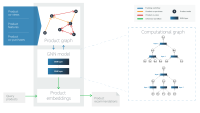Social media can have a big influence on the popularity of certain items. Take, for example, the LEGO Flower Bouquet Building Kit featured on the show Abbott Elementary or the "miracle cleaning paste" seen in millions of online videos. Both have picked up buzz from viral clips and sharing.
On Amazon's Internet Famous page, you can find these and many other products people are talking about — without all the video clips and scrolling. The collection is the brainchild of Ali Dashti's Discovery Tech team, which helps connect shoppers at the Amazon Store with the new and exciting products.
Dashti leads a team at Amazon that collaborates with scientists across multiple organizations to steer the research behind behind building Amazon Store collections, driving recommendations, and improving personalization for customers. He joined Amazon in 2019 after several years in academia — a transition that has been marked by pleasant surprises.
"When I joined Amazon, I was thinking of myself as a small cog in this big machine, but that's not really the case," Dashti says. "You can really have an impact here, in the sense that you can drive business decisions and customer satisfaction."
Exploring new ways to shop on Amazon
Unsurprisingly, many people interact with the Amazon Store through search. You arrive with an idea of what you are looking for, type in your query, and browse the results. While effective, this is just one way to shop. Dashti's team is looking at other ways customers might discover their next favorite thing in the Amazon store.
"Is it possible to digest this list of hundreds of millions of products into smaller collections — thousands of products in tens of categories — that are connected on a narrative, such as specific events like Mother’s Day or back to school?” he elaborates. “Then we want to personalize them for our customers to discover based on their taste and shopping intent."
He breaks this challenge down into two aspects. One is collections built around events and seasonality. The Discovery Tech science team trained a machine learning model that uses seasonality forecasts, recurring marketing input, and collective customers’ past behavior to create collections such as fall or spring favorites and back to school. Another example is evergreen collections such as Internet Famous, which detects cool and viral products featured by influencers year-round. The model uses those signals to automatically create landing pages which feature those products and are discoverable by customers.
The idea for the Internet Famous feature came from a question that came up on the team: Could an algorithm identify whether an image is “cool,” based on buzz from social media influencers? The resulting feature links Amazon’s inventory with conversations on social media platforms.
Our work is more about how we can really understand what people want based on what we know about their short-term and long-term preferences and give our customers the serendipitous sense of discovery in their shopping journey.
“We trained a deep learning model on data from influencers to be a 'cool detector' for the Amazon catalog,” he says.
The second part of the personalization problem, Dashti says, is what the team calls automated merchandising: connecting the right products to individual customers.
“Now that we have these collections, how do we drive traffic to them? If a customer is looking at a product, maybe we can recommend some other products that are internet famous or spring favorites, based on what that customer is viewing,” he explains.
He added that the team is thinking about how to drive discovery for these collections in places where there is no specific intent by customers. For example, the Amazon homepage or an email might offer a “discover customers’ most-loved for you” grouping.
Automated merchandising involves the scientific challenge of making an AI-based personal product recommender of sorts for Amazon customers, answering the question of what content, where in the customer journey, and at what time. It goes beyond creating a set of rules where you might, say, display more shoes if someone has searched for shoes.
“Our work is more about how we can really understand what people want based on what we know about their short-term and long-term preferences and give our customers the serendipitous sense of discovery in their shopping journey, even if they are not looking for a specific category of products,” he says. “Another tenet of our personalization charter is how can we make our recommendations explainable.”
Dashti refers to an explosion of innovation in AI over the past few years based on large language models that can generate text much as a human would.
“This is what we can leverage to improve how our customers experience events such as Father’s Day and back to school — understanding customer journeys as a sequence of preferences and behaviors such as shopping intents, page visits, et cetera, to leverage existing transformer-based language models that help customers sort through the huge catalog of products we have at Amazon and ensure they have a bar-raising experience,” he says.
A pivot from university to tech
Dashti’s academic focus at the University of Wisconsin Milwaukee, cryo-electron microscopy, was seemingly a far cry from what he is doing now. But there is a common thread: He was writing algorithms designed to uncover insights buried in data. When Dashti was an undergraduate at Sharif University of Technology in Iran, a professor and mentor introduced him to the research area of brain-computer interfaces.
During his fourth year, he wrote an algorithm that could identify tasks like thinking about writing a poem or rotating an object based on electroencephalogram signals. From that project, he says, “I got hooked.” He knew he wanted to pursue some form of machine learning.
At the University of Wisconsin, where he earned a master’s in electrical and electronics engineering and a doctorate in biomedical and healthcare informatics, he became interested in cryo-electron microscopy, which can produce atomic-level images of frozen biological samples. He built an algorithm that could help identify conformational changes of molecular machines during their work cycle based on geometric data. His work was cited in the scientific significance section of the 2017 Nobel Prize in chemistry, which cited the development of the imaging technique and its ability to generate 3D images of biomolecules.
After several years, he had built a prestigious academic career and was living comfortably in Milwaukee with his wife and two children. But he had thoughts of moving to industry, where his work would have more tangible impacts. When a recruiter from Amazon reached out, he responded, and before long he was moving to Seattle to join the Fashion Marketing team as an applied scientist.
Soon after he joined Amazon, Carmen Nestares, who was then the group’s chief marketing officer, invited Dashti to get coffee and talked to him about the company’s Day One culture, encouraging him to make his mark.
“This was my boss’s boss’s boss. It was completely out of the blue,” he says. “She really gave me this confidence and ownership that I needed at the time.”
In his first year at the company, Dashti wrote a brief about attribution, the process of determining how different marketing campaigns link to a given purchase. He thought maybe a couple of people would read it.
To his surprise, the brief sparked change. “It went into the roadmap for the next year. A year after that, the team had incorporated my findings into how they thought about attribution. That was amazing,” he said.
Dashti later joined Nestares in building Discovery Tech, where he now manages a team of scientists. He describes Amazon as being like a group of 10,000 startups. “You can have all the freedom of a startup, all that learning experience of putting on multiple hats,” he says. “But you have all the wealth of knowledge in the whole field at your disposal.”
The culture lends itself to a balance between immediate projects and what he has called long-term science discovery moonshots. Among other projects, the team is collaborating with Amazon Scholars Yury Polyanskiy and Sasha Rakhlin, professors of computer science at MIT, in a moonshot-level effort to map customer interactions with products onto complex graph networks to enhance personalization. Another moonshot would be to turn advances in text-to-image generation and computer vision toward searching Amazon’s catalog in new ways — by generating an image based on your own words and surfacing matching products, for example.
In addition to the collaborative nature of his work with the Discovery Tech team, Dashti has appreciated the chance to work with a diverse team and to grow in ways that go beyond technical experience. Parity for women is particularly important to him, given the recent protests in Iran, and he appreciates having mostly women leaders on his current team at Amazon.
“I have always been surrounded by powerful women,” he says, mentioning his mother and his wife, who also grew up in Iran. “Having more women in higher management in tech is a must. It brings balance, pragmatism, empathy — qualities that are really driving this organization.”
As a manager, Dashti supports scientists on his team, about a third of which are women, in pursuing their big ideas. He remembers times in his career before Amazon, he says, when he didn’t really like what he was doing, and it was just a job. He strives to make sure no one on his team reaches that point.
“It starts with ownership,” he says. “I give team members the power to choose what they want, but also the responsibility of seeing the impact of what they do. It’s a management style that requires a lot of trust.”






















